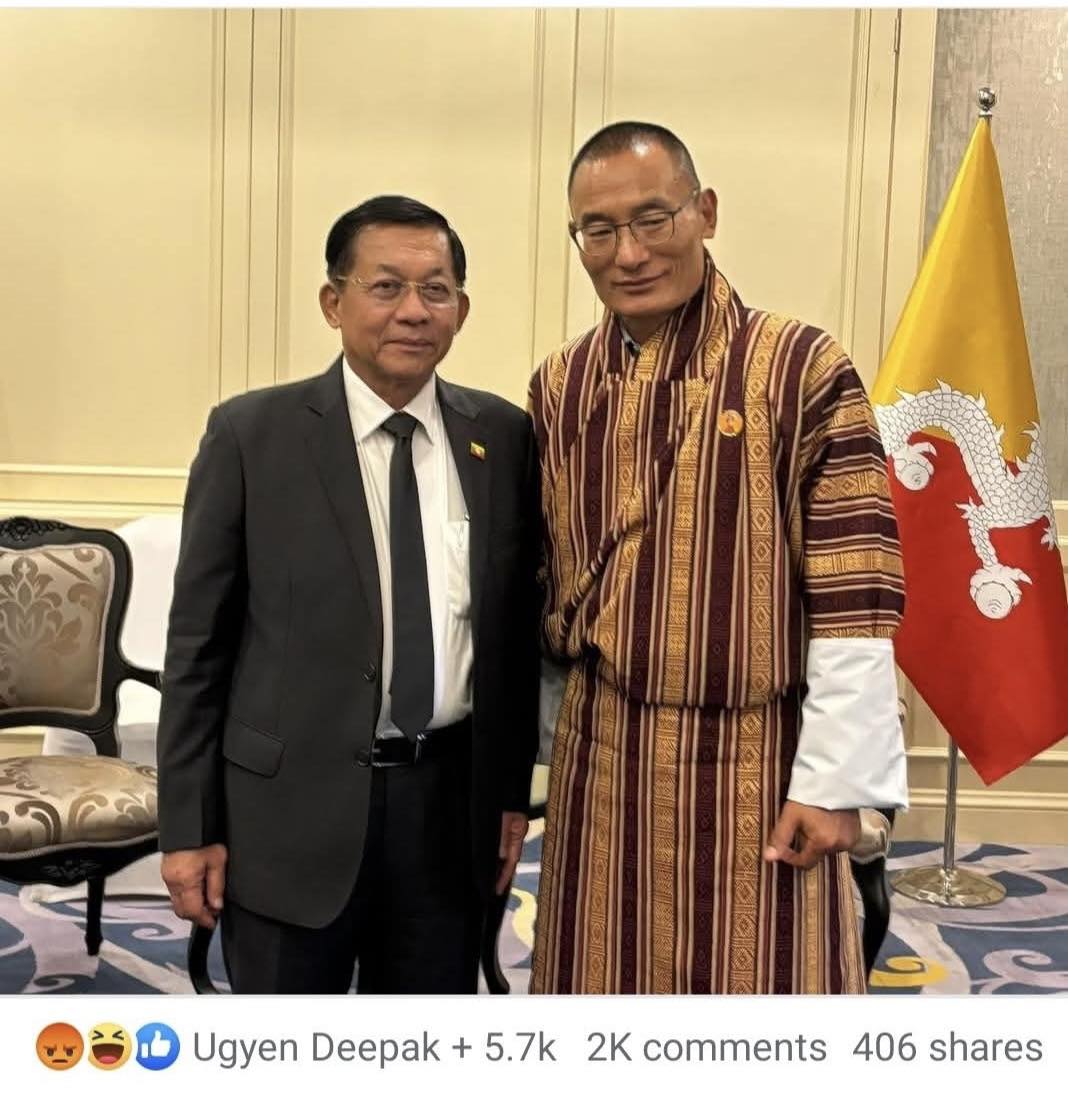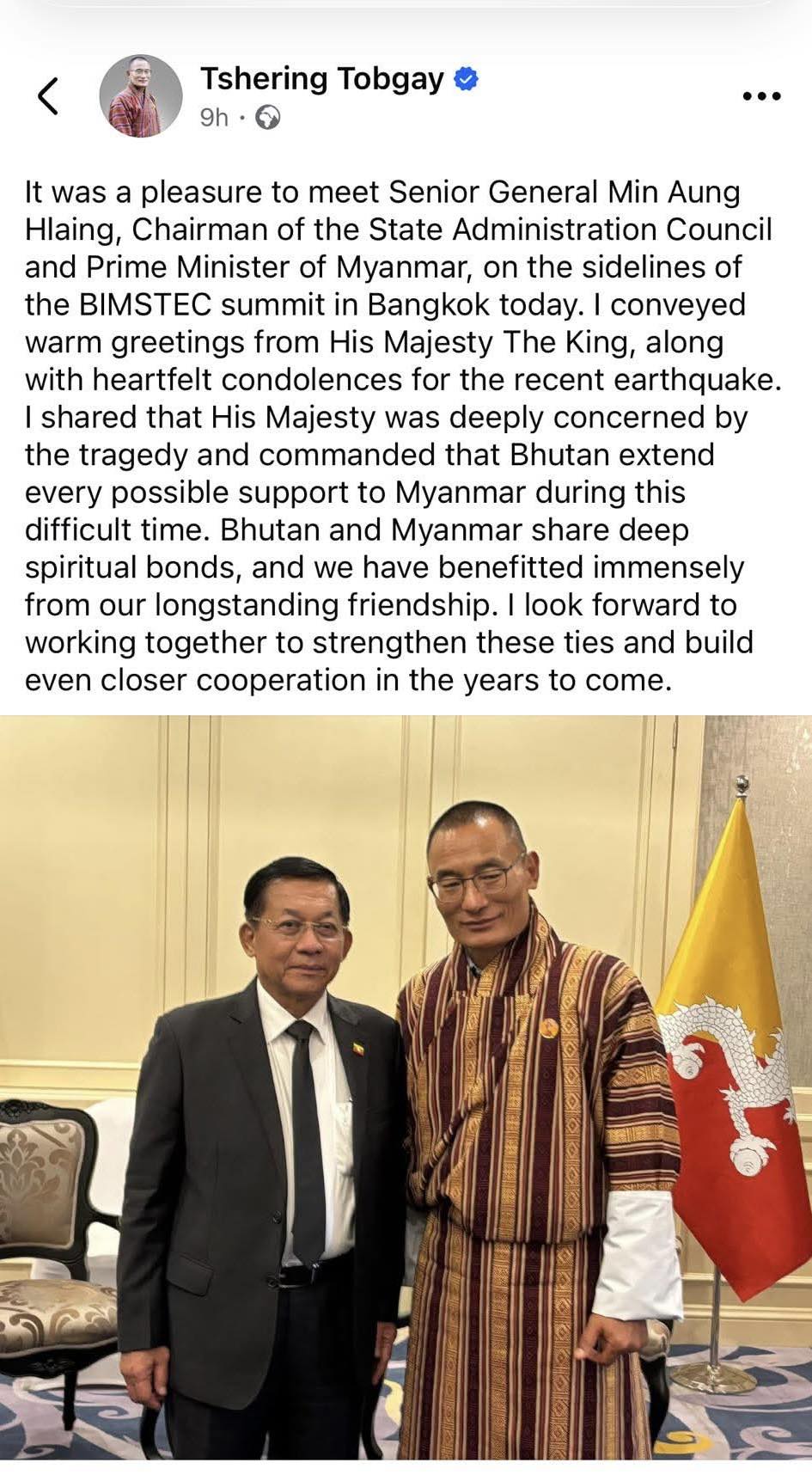Bhutan PM’s Praise for ICC-Wanted Junta Leader Sparks Global Firestorm

Image from https://www.facebook.com/tsheringtobgay
Tobgay faces calls for apology and resignation after public praise of Myanmar’s Min Aung Hlaing — accused of genocide and crimes against humanity.
In a dramatic turn of events shaking Bhutan’s diplomatic standing, Prime Minister Tshering Tobgay has come under intense international fire after publicly meeting and praising Myanmar’s junta leader, Senior General Min Aung Hlaing — a figure globally condemned for atrocities committed since Myanmar’s 2021 military coup.
The encounter, held on the sidelines of the BIMSTEC Summit in Bangkok, was publicized in a Facebook post where Tobgay expressed pleasure in meeting the general, conveyed greetings from Bhutan’s revered King, and spoke of “spiritual bonds” and future cooperation. The post, now deleted, has triggered a tsunami of backlash — especially from the Burmese diaspora and human rights activists, who view the gesture as a betrayal of Bhutan’s long-standing image as a beacon of peace, compassion, and neutrality.
The now-deleted post originally appeared on Tobgay’s official Facebook page, which has over 222,000 followers. By publishing the message on such a high-visibility platform, Tobgay inadvertently elevated what might have been a low-profile diplomatic gesture into a full-blown international controversy.
Visit Official Facebook Page »
Bhutan’s Prime Minister Tshering Tobgay’s recent meeting with Myanmar’s military leader, Min Aung Hlaing, has sparked a wave of anger and disappointment among Burmese people globally, with many taking to social media to express their outrage.
The meeting, which occurred during a regional conference in Bangkok, marks a rare instance of formal engagement between Bhutan and Myanmar’s military regime since the coup in 2021. Images of the Bhutanese PM posing warmly with Min Aung Hlaing were widely circulated online, prompting condemnation from Myanmar nationals who view the military leader as responsible for egregious human rights abuses.
On the sidelines of the BIMSTEC Summit in Bangkok, Prime Minister Tobgay shared a Facebook post that read:
“It was a pleasure to meet Senior General Min Aung Hlaing, State Administration Council and Prime Minister of Myanmar, on the sidelines of the BIMSTEC summit in Bangkok today. I conveyed warm greetings from His Majesty The King, along with heartfelt condolences for the recent earthquake… Bhutan and Myanmar share deep spiritual bonds… I look forward to working together to strengthen these ties and build even closer cooperation in the years to come.”

Image from https://www.facebook.com/tsheringtobgay
The post was swiftly met with outrage. Thousands of Burmese citizens flooded the comments with anger and disbelief. Many accused the Bhutanese PM of legitimizing and praising a man widely condemned for crimes against humanity.
One commenter, Jai Yan Aung, wrote: “Shame on you for standing with a war criminal who has caused so much suffering. This does not reflect the values of peace and compassion that Bhutan is known for.”
Another user, The Crown-Myanmar, stated: “Meeting with General Min Aung Hlaing is not diplomacy, it is complicity… This is a betrayal of the very values Bhutan is known for — peace, compassion, and respect for human rights.”
The decision to praise General Min Aung Hlaing in a highly public manner has escalated the situation far beyond a typical diplomatic controversy. What was likely intended as a standard sideline meeting during a multilateral summit has now become a major stain on Bhutan’s international image.
Critics argue that this is more than a miscalculation — it is a failure of ethical leadership. By invoking the King of Bhutan in the message, Tobgay also inadvertently linked Bhutan’s revered monarchy to a moment of global embarrassment.
“This is not just about Tshering Tobgay anymore,” said a Burmese academic. “This is about Bhutan’s silence, its institutions, and whether the country will uphold its values or quietly try to move on.”
Calls for an official apology have intensified. So far, Prime Minister Tobgay has not issued any public statement, clarification, or apology. The deletion of the Facebook post has only been interpreted as an attempt to deflect from the controversy rather than address it.
“Deleting the post is not enough,” said Emily Ingynn, a Myanmar activist. “You don’t shake hands with a war criminal, praise him, drag your King into it, and then vanish from accountability.”
The criticism is underscored by the fact that the International Criminal Court (ICC) issued an arrest warrant for Min Aung Hlaing in late 2024 for his role in atrocities committed during the military’s crackdown on the Rohingya and other civilians. Médecins Sans Frontières (MSF) reported that more than 6,700 Rohingya including at least 730 children under the age of five were killed in a single month, and Min Aung Hlaing has also been accused of blocking humanitarian aid and orchestrating brutal attacks amid Myanmar’s ongoing civil war.
A sampling of online comments from Burmese users, many of which have gone viral, shows the extent of the backlash:
“Shocked to see Bhutan PM meeting with terrorist Myanmar military. It’s like supporting Hitler.”
“Disappointed in Bhutan. We thought your country stood for peace. That’s not what peace looks like.”
“Min Aung Hlaing is a murderer and rapist. He killed our children and burned our villages. Bhutan, why?”
“We are dying under a brutal regime and yet you smile and shake hands with our killer. Shame.”
“People are suffering from Cyclone Mocha, and instead of helping, Bhutan’s PM is taking photos with the killer.”
“Bhutan government has lost our respect. We will never forget this.”
“No genuine leader should stand next to a war criminal like Min Aung Hlaing.”
“Please be with the people, not with the murderers. Bhutan’s image is ruined in our hearts.”
“You stood with evil. Don’t expect silence from us.”
“Bhutan might as well sign a pact with the devil. This is betrayal.”
Additional reactions extracted from Burmese public posts include:
“Tobgay! You shake the bloody hand of the killer who destroyed our dreams.”
“Bhutan, the land of Gross National Happiness, how can you side with a butcher?”
“Is this how you show kindness? By smiling with the oppressor of our children?”
“We counted on moral countries like Bhutan to stand with truth. You have broken that hope.”
“It’s a photo op with a dictator and a photo that will haunt Bhutan’s legacy.”
“Millions are displaced and suffering. A handshake with the general is a stab in our hearts.”
“Your kindness to him is cruelty to us.”
“Innocents are dying every day, and you shake hands with their killer.”
“No words can express how betrayed we feel.”
“We will remember the smile on Tobgay’s face while our people bleed.”
The criticism highlights the continuing sensitivity of international engagement with Myanmar’s junta. Since the February 2021 military coup that ousted the democratically elected government of Aung San Suu Kyi, the military has waged a violent crackdown on dissent, leading to thousands of deaths, widespread arrests, and a burgeoning civil war.
Observers say Bhutan’s engagement, even if ceremonial or diplomatic in nature, risks legitimizing a regime accused of crimes against humanity.
Damage to Bhutan’s Image and Future Standing
For decades, Bhutan has been admired as a peaceful, spiritual kingdom — known for its Gross National Happiness philosophy, its non-violent Buddhist principles, and its global neutrality in conflicts. The fallout from this incident now threatens that image. Many feel that Bhutan’s moral credibility has been undermined, and its neutrality compromised.
“This is a pivotal moment for Bhutan,” said a former Bhutanese diplomat. “Do we stand with peace and dignity, or do we excuse or ignore violence for the sake of regional politics?”
The backlash has also reignited unresolved historical grievances, particularly regarding Bhutan’s own record on ethnic issues. In the early 1990s, Bhutan expelled over 100,000 ethnic Nepali-speaking Lhotshampa people, leading to one of South Asia’s most protracted refugee crises. Thousands remained in camps in eastern Nepal for decades, with many later resettled in Western countries. Bhutan has never formally acknowledged this expulsion as ethnic cleansing, and critics say its silence on the matter undermines its moral high ground.
Moreover, concerns persist regarding the treatment of political prisoners and lack of space for dissent within the country. Human rights groups have long criticized the absence of press freedom and political opposition in Bhutan, painting a more complex picture behind its serene global image.
Adding to the complexity of the fallout, many Bhutanese citizens have pointed out that the tireless efforts of Bhutan’s present King to make Bhutan ethically, morally, religiously, diplomatically, and politically great have come under a great setback with this warm meeting between Tobgay and the Myanmar dictator. The King’s reputation, carefully upheld for decades, now faces collateral reputational damage, simply by being mentioned in the Prime Minister’s now-deleted message.
As social media continues to erupt and forums associated with Bhutan remain flooded with angry comments, it’s clear the damage is far from over. The Bhutanese public, long proud of their country’s principled international posture, now waits for their Prime Minister to either own up to his actions — or step down.
One thing is certain: the world is watching, and silence is no longer an option.
The Bhutanese government has yet to issue an official response to the backlash. However, analysts suggest this incident may affect Bhutan’s reputation in the eyes of pro-democracy supporters in Myanmar and beyond.
Regional dynamics remain complex, with countries in South and Southeast Asia balancing diplomatic interests with growing calls for moral accountability.
As the Burmese public continues to push back against the military through both armed resistance and global advocacy, the cost of perceived support—intentional or not—has become increasingly high for foreign governments.
Conclusion
In light of the escalating backlash and the moral questions raised, many believe that Bhutan must now issue a formal public statement to clarify its position. Not only to protect its own ethical standing but also to express solidarity with the victims of the Myanmar genocide and reassure human rights advocates worldwide that Bhutan remains on the side of peace, justice, and humanity.